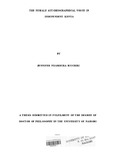| dc.description.abstract | This study sets out to analyse the female autobiographical voice In independent
Kenya. The study investigates the body of female autobiographies as it exists In
Kenya, focusing on the nature and function of autobiography as they exhibit
themselves in the autobiographies under study. It takes a keen look at how the
autobiographical voice enables the writers to narrate their stories as they analyse
personal and social relationships.
The study examines the female autobiographical voice as a tool for women's selfexploration
and self-definition. The choice of the narrative voice In female
autobiographies enables us to study issues peculiar to women. Available studies
indicate that this specialty has not received attention from literary scholars yet it is
crucial to the understanding of autobiographical writing in Kenya.
The study focuses on autobiographies by Charity Waciuma, Wanjiku Kabira, Esther
Owuor, Rasna Warah, Wambui Otieno. Muthoni Likimani. and Wangari Maathai.
The study adopts three approaches to literary criticism: theory of autobiography,
feminist literary criticism and textual analysis. The theory of autobiography directs
our investigation of the autobiographies by focusing on the particulars of the genre;
feminist literary criticism focuses on the significance of gender issues, history,
politics, and culture as they appear in the autobiographies under study; and textual
analysis emphasises on the text and enables us to discuss the narrative voice in the
autobiographies. The study derives its conclusions exclusively from the
autobiographies under study.The study finds out that the autobiography is the most appropriate form of women's self-expression as it enables them to narrate their stories in their own voices and to highlight social concerns from a domestic and personaiised perspective. The
autobiographical act becomes a means of empowerment for the Kenyan woman as she
seeks her inner self, discovers it. and narrates it for the world to read. The study
discovers that some autobiographers employ the autobiographical form to advance
agenda other than self-revelation and self-appraisal. In addition. the study shows that
the available autobiographies by Kenyan women do not represent the ordinary
Kenyan woman.
The study recommends further research in the field of the autobiography in Kenya,
focusing on the male autobiography to highlight its concerns and compare it to the
female autobiography. In addition, the study recommends a comparative study of the
autobiography in Kenya and other regions. | en |

